YES Mooc UPB-IT: Unterschied zwischen den Versionen
Keine Bearbeitungszusammenfassung |
Keine Bearbeitungszusammenfassung |
||
| Zeile 1: | Zeile 1: | ||
<big>'''<big> | <big>'''<big>Benvenuti nel MOOC di YES!</big>'''</big> | ||
<big>'''YES - Youth Engagement in Society'''</big> | <big>'''YES - Youth Engagement in Society'''</big> | ||
| Zeile 7: | Zeile 7: | ||
[[Datei:YES-Logo.jpg|miniatur|center|YES | [[Datei:YES-Logo.jpg|miniatur|center|Logo del Progetto YES]] | ||
Attraverso questo MOOC ti forniremo informazioni sull'uso del Serious Game YES. Il gioco presentato intende favorire il dibattito, è gratuito, potrai usufruirne senza alcun tipo di spesa. | |||
Troverete il gioco YES al seguente link: http://yes-cards.dev-lg.de/ | |||
Questo MOOC è stato creato all'interno del progetto YES. YES è l‘acronimo di "Youth Engagement in Society". YES è un progetto internazionale realizzato nell’ambito del programma educativo europeo ERASMUS +. | |||
[[Datei:UPB-Germany wp logo large - jpg.jpg|miniatur|center|Logo di UPB]] | |||
[[Datei:IngeniousKnowledge Logo jpg.jpg|miniatur|center|Logo di IngeniousKnowledge]] | |||
[[Datei:Erasmus+logo mic.jpg|miniatur|center|Logo di ERASMUS+]] | |||
[[Datei:Erasmus+logo mic.jpg|miniatur|center|ERASMUS+ | |||
| Zeile 38: | Zeile 32: | ||
== | == Informazioni sul MOOC di YES == | ||
In questa sezione troverai informazioni sul gruppo principale di destinatari, scoprirai quali sono gli obiettivi del MOOC, i suoi risultati, la sua idea e struttura di base. | |||
=== Gruppo dei destinatari principali === | |||
I principali destinatari del MOOC sono: | |||
* operatori giovanili | |||
* educatori giovanili | |||
* organizzazioni giovanili | |||
* Utenti di YES | |||
* persone che sono interessate ai Serious Games | |||
=== Obiettivi del MOOC di YES === | |||
Gli obiettivi di questo MOOC sono | |||
* fornire agli operatori giovanili, agli educatori giovanili e alle organizzazioni giovanili informazioni dettagliate sullo strumento. | |||
* fornire informazioni su come usare il Serious Game in contesti educativi. | |||
* descrivere i modelli di discussione supportati dallo strumento YES. | |||
* mostrare degli esempi di schermate del gioco. | |||
* fornire suggerimenti pedagogici e didattici. | |||
* condividere idee e argomenti di discussione. | |||
* sensibilizzare e informare sull'uso dei Serious Game nell'educazione dei giovani. | |||
=== Risultati Attesi === | |||
Gli studenti / il gruppo di beneficiari del Mooc: | |||
* impareranno le regole e i formati di discussione di YES. | |||
* entreranno in contatto con il concetto di “Serious Game”. | |||
* svolgeranno delle azioni mirate a ottenere una conoscenza più approfondita del gioco di carte YES. | |||
* si focalizzeranno su argomenti importani in ambito europeo come esempio di possibili argomenti da utilizzare per le discussioni su YES. | |||
* ripenseranno e rimoduleranno il proprio modo di imparare/insegnare. | |||
* acquisiranno informazioni sul progetto ERASMUS + YES. | |||
=== | === Obiettivi e struttura del YES-MOOC === | ||
Il MOOC renderà più facile per gli animatori giovanili reperire lo strumento YES e imparare come utilizzarlo per insegnare ai propri discenti le capacità di dibattito produttivo che sono essenziali per partecipare alla politica e alla cittadinanza attiva in Europa. Voi, Formatori e animatori giovanili, dovreste essere in grado di avere un'idea del perché YES sia uno strumento utile per i gruppi giovanili. Ecco perché abbiamo deciso di fornire informazioni e attività di apprendimento su:> l'idea di YES> i formati e le impostazioni del gioco> i tipi di carte e un'introduzione ai set di carte demo> la struttura e il corso del gioco (Schermate e descrizioni)> l'importanza della preparazione e delle sequenze di follow-up> il link al nostro sito Web e allo strumento YES | |||
> | |||
> | |||
> | |||
> | |||
> | |||
> | |||
Quindi iniziamo! | |||
== | == Introduzione == | ||
Quando si parla di modi di apprendimento moderni e innovativi, non si può non considerare approcci basati sul gioco e “Serius Games” che stanno diventando sempre più popolari, ogni generazione ha i suoi bisogni. I giovani vivono in un mondo digitale in rapida evoluzione. Sono abituati alla tecnologia moderna e le vecchie forme tradizionali di apprendimento non sono considerate attraenti come una volta. Ecco perché l'apprendimento basato sul gioco digitale è diventato sempre più popolare nel corso degli anni. Solo uno sguardo all'utilizzo di smartphone, tablet e computer nella vita quotidiana della gioventù offre diverse buone ragioni per addentrarsi in questo mondo. L'approccio di YES, che presentiamo in questo MOOC, è un'innovativa opportunità di apprendimento che tiene conto dei cambiamenti delle possibilità e dell'ambiente in cui i giovani vivono: YES è un serious game che supporta i processi di discussione. L'apprendimento avviene utilizzando le risorse disponibili. Inoltre, i processi di apprendimento di solito sono condizionati da vincoli temporali. Nel complesso, si può affermare che le condizioni di base delle lezioni sono molto diverse. Oltre a ciò, è compito degli animatori, insegnanti e formatori preparare i giovani studenti. I giovani affrontano i nuovi media nella loro vita quotidiana e sono coinvolti in un ambiente internazionale europeo. Quindi, devono affrontare le opportunità e le sfide che si presentano nei loro ambienti di vita reale. I giovani sono immersi in diverse situazioni nella società e nel mercato del lavoro, lì i dispositivi mobili e i nuovi media hanno già un posto di rilievo in questi ambiti. Sono elementi standard e fanno parte di una crescente tendenza alla digitalizzazione. I discenti dovrebbero essere preparati per situazioni standard ed è per questo che abbiamo deciso di fornire a insegnanti e formatori questo libro sui nuovi sviluppi e sulla gestione dell'apprendimento mobile negli scenari di insegnamento. Gli insegnanti devono diventare esperti dei nuovi media e di approcci innovativi all'apprendimento basati sul gioco: benvenuti nel YES-MOOC. | |||
YES | |||
== | == Informazioni sul progetto ERASMUS+ YES == | ||
Questo MOOC si concentra sul “Serious Game” YES. Questo gioco è stato progettato attraverso il progetto YES. | |||
[[Datei:YES-Logo.jpg|miniatur|center|YES | [[Datei:YES-Logo.jpg|miniatur|center|Logo del Progetto YES]] | ||
Il Progetto è stato cofinanziato dall’Unione Europea: | |||
[[Datei:LogosBeneficairesErasmus+RIGHT EN.jpg|miniatur|ERASMUS+ | [[Datei:LogosBeneficairesErasmus+RIGHT EN.jpg|miniatur|Logo ERASMUS+]] | ||
Per ottenere maggiori informazioni sul progetto potete consultare il sito web del progetto YES: | |||
[http://eduproject.eu/yes/en/ Link YES Website] | |||
=== L'obiettivo principale di YES? === | |||
È quello di creare, implementare, testare e valutare uno strumento e un sistema online basati sul gioco (come un gioco basato sulla sulla creazione di un mazzo di carte) per discutere in gruppo di argomenti di rilevanza europea. In YES, il sistema proposto sarà uno strumento basato sul gioco in forma di un gioco di carte online magnificamente animato che mira a incoraggiare i dibattiti sulla politica e la società tra i giovani. I giovani formeranno squadre che potrebbero consistere in classi scolastiche o squadre miste internazionali. | |||
Il sistema offre essenzialmente un ambiente online per tenere dibattiti ben strutturati su questioni sociali o politiche che utilizzano un approccio di gamification per incoraggiare i giovani di diverse età alla partecipazione attiva. Pertanto, si parla di un meccanismo di gioco di carte che prevede che gli studenti si uniscano in squadre che si affrontano l'una contro l'altra, ciò costituisce la base stessa del sistema. | |||
=== Perché creare un gioco / strumento rivolto ai giovani con un argomento così specifico? === | |||
A causa degli attuali eventi politici come gli attacchi terroristici, BREXIT, la crisi dell'euro o il problema della migrazione, è di particolare importanza che i giovani si rendano conto che essi, in quanto cittadini dell'Europa, hanno un'influenza sul futuro e quindi anche sull'Europa. Devono rendersi conto che considerati come unità possono creare il futuro dell'Europa, che essi sono il futuro dell'Europa e che dovrebbero partecipare per condurre le vite che vogliono in futuro. Assicurare che questa via venga percorsa garantisce che essi siano introdotti e inclusi nelle situazioni attuali in Europa, è dare loro un'occasione ludica per aumentare le loro conoscenze e la loro opinione su alcune questioni europee, questo è quello che intende fare lo strumento YES. L'idea principale di YES? Lo strumento fornisce un metodo di apprendimento nel campo del cosidetto “apprendimento basato sul gioco”. L'idea di base del Serious Game YES nel progetto è di promuovere la cittadinanza attiva e fornire informazioni sull'Europa offrendo oportunità di discussione con un approccio basato sul gioco. Le squadre devono preparare il proprio mazzo di carte con diverse affermazioni che siano appropriate per rafforzare e difendere la propria posizione creando carte con funzioni speciali (come argomento e contro-argomento). Ciò rende l'intero sistema altamente flessibile in quanto non vi è alcun limite nel numero di squadre che stanno giocando l'una contro l'altra, né nel numero di giovani che si riuniscono per costruire una squadra. “I giochi e i serious games sono una parte importante del lavoro giovanile, offrono la possibilità di mettere in contatto le persone, farle divertire e allo stesso tempo dare energia positiva ai giovani, ma hanno anche un altro aspetto importante: l'istruzione, un apprendimento basato sul principio - imparare facendo -" (Beutner, Jakunaite, Rüscher 2018). | |||
=== | === Gli obiettivi di YES: quali abilità e competenze saranno promosse con YES? === | ||
Prima di tutto il giovane studente acquisirà conoscenze relative all'argomento. Si discuterà un argomento specifico attraverso lo strumento YES. L'argomento può essere selezionato dagli animatori giovanili / formatori o dagli studenti. Quindi gli studenti acquisiranno attraverso lo strumento conoscenze e competenze e diventeranno esperti nel tema scelto. YES si è focalizzato sui temi della cittadinanza europea e la politica creando i mazzi di carte demo già presenti sulla piattaforma. Per i giovani europei è utile e importante diventare cittadini attivi, conoscere le idee europee, la cultura e la cooperazione europee. Gli operatori giovanili e gli studenti possono anche integrare altri argomenti nel gioco. Oltre alla conoscenza dell'argomento selezionato che sarà discusso con YES, i giovani acquisiranno anche ulteriori competenze molto importanti: | |||
* Comunicazione nella lingua madre | |||
* Comunicazione in lingue straniere | |||
* Competenza matematica e competenze di base in scienza e tecnologia | |||
* Competenza digitale | |||
* Imparare quali sia il metodo di apprendimeno più adatto ad ogni singola personalità | |||
* Competenze sociali e civiche | |||
* Senso di iniziativa e imprenditorialità | |||
* Consapevolezza ed espressione culturale | |||
== | == Che tipo di modelli di discussione offre YES? == | ||
Lo scopo di YES è quello di promuovere alcune competenze e abilità dei giovani attraverso le interazioni di squadra durante il gioco. Discutere / dibattere su vari argomenti, in questo caso sull'UE, consente ai giovani di sviluppare o migliorare specifiche abilità e competenze. | |||
[[Datei:Debating models.jpg|miniatur|Modelli di dibattito di YES - Modello di discussione, modello rappresentativo e modello di elezione]] | |||
Modelli di dibattito di YES | |||
Modello di discussione, modello rappresentativo e modello di elezione. | |||
# Nel modello di discussione un team gioca contro un altro per vincere la partita. È prevista una discussione con pro e contro riguardo un determinato argomento. Un team difenderà i pro e l’altro i contro. | |||
# Nel modello rappresentativo avrà luogo un dibattito fra un massimo di 5 team. Ogni team verrà rappresentato da una sola persona, che difenderà una determinata posizione riguardo un tema precedentemente scelto. | |||
# Nel modello di elezione vi sarà un dibattito fra un massimo di 5 team per simulare un’elezione, ciò avverrà tramite una sessione divisa in più parti dallo strumento stesso | |||
=== | === Domanda a scelta multipla che riguarda il modello di discussione === | ||
<div class="multiplechoice-quiz"> | <div class="multiplechoice-quiz"> | ||
''' | '''Quanti modelli di discussione ci sono nel gioco con finalità educativa YES?''' | ||
(!1) | (!1) | ||
(!2) | (!2) | ||
| Zeile 171: | Zeile 147: | ||
... | ... | ||
=== | === Compito scritto riguardante il gioco di Carte === | ||
<div class="lueckentext-quiz"> | <div class="lueckentext-quiz"> | ||
Version vom 27. März 2018, 12:07 Uhr
Benvenuti nel MOOC di YES!
YES - Youth Engagement in Society

Attraverso questo MOOC ti forniremo informazioni sull'uso del Serious Game YES. Il gioco presentato intende favorire il dibattito, è gratuito, potrai usufruirne senza alcun tipo di spesa.
Troverete il gioco YES al seguente link: http://yes-cards.dev-lg.de/
Questo MOOC è stato creato all'interno del progetto YES. YES è l‘acronimo di "Youth Engagement in Society". YES è un progetto internazionale realizzato nell’ambito del programma educativo europeo ERASMUS +.
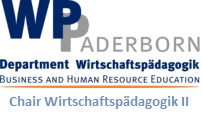


Informazioni sul MOOC di YES
In questa sezione troverai informazioni sul gruppo principale di destinatari, scoprirai quali sono gli obiettivi del MOOC, i suoi risultati, la sua idea e struttura di base.
Gruppo dei destinatari principali
I principali destinatari del MOOC sono:
- operatori giovanili
- educatori giovanili
- organizzazioni giovanili
- Utenti di YES
- persone che sono interessate ai Serious Games
Obiettivi del MOOC di YES
Gli obiettivi di questo MOOC sono
- fornire agli operatori giovanili, agli educatori giovanili e alle organizzazioni giovanili informazioni dettagliate sullo strumento.
- fornire informazioni su come usare il Serious Game in contesti educativi.
- descrivere i modelli di discussione supportati dallo strumento YES.
- mostrare degli esempi di schermate del gioco.
- fornire suggerimenti pedagogici e didattici.
- condividere idee e argomenti di discussione.
- sensibilizzare e informare sull'uso dei Serious Game nell'educazione dei giovani.
Risultati Attesi
Gli studenti / il gruppo di beneficiari del Mooc:
- impareranno le regole e i formati di discussione di YES.
- entreranno in contatto con il concetto di “Serious Game”.
- svolgeranno delle azioni mirate a ottenere una conoscenza più approfondita del gioco di carte YES.
- si focalizzeranno su argomenti importani in ambito europeo come esempio di possibili argomenti da utilizzare per le discussioni su YES.
- ripenseranno e rimoduleranno il proprio modo di imparare/insegnare.
- acquisiranno informazioni sul progetto ERASMUS + YES.
Obiettivi e struttura del YES-MOOC
Il MOOC renderà più facile per gli animatori giovanili reperire lo strumento YES e imparare come utilizzarlo per insegnare ai propri discenti le capacità di dibattito produttivo che sono essenziali per partecipare alla politica e alla cittadinanza attiva in Europa. Voi, Formatori e animatori giovanili, dovreste essere in grado di avere un'idea del perché YES sia uno strumento utile per i gruppi giovanili. Ecco perché abbiamo deciso di fornire informazioni e attività di apprendimento su:> l'idea di YES> i formati e le impostazioni del gioco> i tipi di carte e un'introduzione ai set di carte demo> la struttura e il corso del gioco (Schermate e descrizioni)> l'importanza della preparazione e delle sequenze di follow-up> il link al nostro sito Web e allo strumento YES
Quindi iniziamo!
Introduzione
Quando si parla di modi di apprendimento moderni e innovativi, non si può non considerare approcci basati sul gioco e “Serius Games” che stanno diventando sempre più popolari, ogni generazione ha i suoi bisogni. I giovani vivono in un mondo digitale in rapida evoluzione. Sono abituati alla tecnologia moderna e le vecchie forme tradizionali di apprendimento non sono considerate attraenti come una volta. Ecco perché l'apprendimento basato sul gioco digitale è diventato sempre più popolare nel corso degli anni. Solo uno sguardo all'utilizzo di smartphone, tablet e computer nella vita quotidiana della gioventù offre diverse buone ragioni per addentrarsi in questo mondo. L'approccio di YES, che presentiamo in questo MOOC, è un'innovativa opportunità di apprendimento che tiene conto dei cambiamenti delle possibilità e dell'ambiente in cui i giovani vivono: YES è un serious game che supporta i processi di discussione. L'apprendimento avviene utilizzando le risorse disponibili. Inoltre, i processi di apprendimento di solito sono condizionati da vincoli temporali. Nel complesso, si può affermare che le condizioni di base delle lezioni sono molto diverse. Oltre a ciò, è compito degli animatori, insegnanti e formatori preparare i giovani studenti. I giovani affrontano i nuovi media nella loro vita quotidiana e sono coinvolti in un ambiente internazionale europeo. Quindi, devono affrontare le opportunità e le sfide che si presentano nei loro ambienti di vita reale. I giovani sono immersi in diverse situazioni nella società e nel mercato del lavoro, lì i dispositivi mobili e i nuovi media hanno già un posto di rilievo in questi ambiti. Sono elementi standard e fanno parte di una crescente tendenza alla digitalizzazione. I discenti dovrebbero essere preparati per situazioni standard ed è per questo che abbiamo deciso di fornire a insegnanti e formatori questo libro sui nuovi sviluppi e sulla gestione dell'apprendimento mobile negli scenari di insegnamento. Gli insegnanti devono diventare esperti dei nuovi media e di approcci innovativi all'apprendimento basati sul gioco: benvenuti nel YES-MOOC.
Informazioni sul progetto ERASMUS+ YES
Questo MOOC si concentra sul “Serious Game” YES. Questo gioco è stato progettato attraverso il progetto YES.

Il Progetto è stato cofinanziato dall’Unione Europea:

Per ottenere maggiori informazioni sul progetto potete consultare il sito web del progetto YES:
L'obiettivo principale di YES?
È quello di creare, implementare, testare e valutare uno strumento e un sistema online basati sul gioco (come un gioco basato sulla sulla creazione di un mazzo di carte) per discutere in gruppo di argomenti di rilevanza europea. In YES, il sistema proposto sarà uno strumento basato sul gioco in forma di un gioco di carte online magnificamente animato che mira a incoraggiare i dibattiti sulla politica e la società tra i giovani. I giovani formeranno squadre che potrebbero consistere in classi scolastiche o squadre miste internazionali. Il sistema offre essenzialmente un ambiente online per tenere dibattiti ben strutturati su questioni sociali o politiche che utilizzano un approccio di gamification per incoraggiare i giovani di diverse età alla partecipazione attiva. Pertanto, si parla di un meccanismo di gioco di carte che prevede che gli studenti si uniscano in squadre che si affrontano l'una contro l'altra, ciò costituisce la base stessa del sistema.
Perché creare un gioco / strumento rivolto ai giovani con un argomento così specifico?
A causa degli attuali eventi politici come gli attacchi terroristici, BREXIT, la crisi dell'euro o il problema della migrazione, è di particolare importanza che i giovani si rendano conto che essi, in quanto cittadini dell'Europa, hanno un'influenza sul futuro e quindi anche sull'Europa. Devono rendersi conto che considerati come unità possono creare il futuro dell'Europa, che essi sono il futuro dell'Europa e che dovrebbero partecipare per condurre le vite che vogliono in futuro. Assicurare che questa via venga percorsa garantisce che essi siano introdotti e inclusi nelle situazioni attuali in Europa, è dare loro un'occasione ludica per aumentare le loro conoscenze e la loro opinione su alcune questioni europee, questo è quello che intende fare lo strumento YES. L'idea principale di YES? Lo strumento fornisce un metodo di apprendimento nel campo del cosidetto “apprendimento basato sul gioco”. L'idea di base del Serious Game YES nel progetto è di promuovere la cittadinanza attiva e fornire informazioni sull'Europa offrendo oportunità di discussione con un approccio basato sul gioco. Le squadre devono preparare il proprio mazzo di carte con diverse affermazioni che siano appropriate per rafforzare e difendere la propria posizione creando carte con funzioni speciali (come argomento e contro-argomento). Ciò rende l'intero sistema altamente flessibile in quanto non vi è alcun limite nel numero di squadre che stanno giocando l'una contro l'altra, né nel numero di giovani che si riuniscono per costruire una squadra. “I giochi e i serious games sono una parte importante del lavoro giovanile, offrono la possibilità di mettere in contatto le persone, farle divertire e allo stesso tempo dare energia positiva ai giovani, ma hanno anche un altro aspetto importante: l'istruzione, un apprendimento basato sul principio - imparare facendo -" (Beutner, Jakunaite, Rüscher 2018).
Gli obiettivi di YES: quali abilità e competenze saranno promosse con YES?
Prima di tutto il giovane studente acquisirà conoscenze relative all'argomento. Si discuterà un argomento specifico attraverso lo strumento YES. L'argomento può essere selezionato dagli animatori giovanili / formatori o dagli studenti. Quindi gli studenti acquisiranno attraverso lo strumento conoscenze e competenze e diventeranno esperti nel tema scelto. YES si è focalizzato sui temi della cittadinanza europea e la politica creando i mazzi di carte demo già presenti sulla piattaforma. Per i giovani europei è utile e importante diventare cittadini attivi, conoscere le idee europee, la cultura e la cooperazione europee. Gli operatori giovanili e gli studenti possono anche integrare altri argomenti nel gioco. Oltre alla conoscenza dell'argomento selezionato che sarà discusso con YES, i giovani acquisiranno anche ulteriori competenze molto importanti:
- Comunicazione nella lingua madre
- Comunicazione in lingue straniere
- Competenza matematica e competenze di base in scienza e tecnologia
- Competenza digitale
- Imparare quali sia il metodo di apprendimeno più adatto ad ogni singola personalità
- Competenze sociali e civiche
- Senso di iniziativa e imprenditorialità
- Consapevolezza ed espressione culturale
Che tipo di modelli di discussione offre YES?
Lo scopo di YES è quello di promuovere alcune competenze e abilità dei giovani attraverso le interazioni di squadra durante il gioco. Discutere / dibattere su vari argomenti, in questo caso sull'UE, consente ai giovani di sviluppare o migliorare specifiche abilità e competenze.

Modelli di dibattito di YES
Modello di discussione, modello rappresentativo e modello di elezione.
- Nel modello di discussione un team gioca contro un altro per vincere la partita. È prevista una discussione con pro e contro riguardo un determinato argomento. Un team difenderà i pro e l’altro i contro.
- Nel modello rappresentativo avrà luogo un dibattito fra un massimo di 5 team. Ogni team verrà rappresentato da una sola persona, che difenderà una determinata posizione riguardo un tema precedentemente scelto.
- Nel modello di elezione vi sarà un dibattito fra un massimo di 5 team per simulare un’elezione, ciò avverrà tramite una sessione divisa in più parti dallo strumento stesso
Domanda a scelta multipla che riguarda il modello di discussione
Quanti modelli di discussione ci sono nel gioco con finalità educativa YES? (!1) (!2) (3) (!4)
...
Compito scritto riguardante il gioco di Carte
"In the YES Serious Game we are learning to prepare discussions and discuss topics within a Card Deck Game.
A Card Deck Game is very common between young learners. The know it from breaks at school and from the playground.
Examples for other popular Card Deck Games are the game Magic from the US, or the Pokemon from Japan."
Using the YES Serious Game
YES is unique because it is the first time active citizenship is fostered by a game-based approach based on a deck-building card game.
There are some measures and projects which focus on active citizenship like (CIAC- CIAC – Creativity and Innovation for active citizenship,, CIVIC MIMDS, GOAL – Granting Opportunities for Active Learning, PPP - People Power Participation,VOICE – Developing citizens etc.) but the always stick to traditional courses or concept design. Only a few focus on online learning but this is typically not done in a synchronous way in these approaches. Moreover, none of these approaches include real game-based approaches and innovative online debating systems (we did a research on 30 project about active citizenship - you can find them under http://de.youropa-project.eu/projektauswahl/30-ausgewahlte-projekte/).
But YES uses game aspects which are focusing on elements of deck-building card games with which the learners are typically familiar with and combines this with learning about Europe and active citizenship.
The young people are used to playing deck-building card games or collectable card games with real cards such as POKEMON, Yu-Gi-Oh, Digimon, Magic theGathering, StarWars, Game of Thrones, etc. or on online platforms or apps (ASCENSION, DECK Heros etc.).
We use the motivational aspect of such a game structure which is played by millions of young kids and youths over Europe and put it in a completely new context.
Multiple-Choice concerning the use of YES
What is special about YES? (!YES is a traditional eLearning approach) (YES is a serious game which fosters the motivation.) (!YES is a video approach.) (!YES is a game with real paper cards.)
...
How the debate works
The objective of the YES is to encourage productive debates that authentically reflect the way how societal or political debates take place in real life, always having the claim to foster learning about the discussed topics in mind. There are three steps to take in the YES approach and the use of the YES game:

Hence, the first step to do would be to prepare the debate.
Research on the topic = Preparation phase
Therefore, the learners conduct research to the debate's topic, they search for background information and facts, and they have to prepare arguments and counter-arguments that will then be written down on the cards. Here, the learner gather knowledge and competences in the field they have to discuss.
This requires the learners to anticipate the argument and counter-arguments of the other teams as well which pretty much implies the extent of research necessary to undertake by each of the teams, particularly when playing with more than only two teams. But this also shows that the research process itself and all of its outcomes are highly valuable for the learners, which is why resources of high quality, prepared materials, summaries that have been created, etc. should be stored and kept available. Prepared materials that weren't a part of the cards could also be made available to other learners or even teachers as some kind of Open Educational Resource.
The debate = discussion and game phase
In the second phase the debate itself starts after the preparation took place. When thinking of a debate in which a pro- and a contra-team compete against each other, the one side could start with an argument for their side. The other team could play a card with a counter-argument that specifically targets the argument that was drawn before. Deciding which card to play is a democratic process which has a time limit (as mentioned in the noted above). When it's the team's turn the members can choose which card to play and once they have a majority the card will be turned over and added to the official timeline of the debate. This will encourage discussions among the team members. At the end of each game can be public voting (election model). Instead of just asking to vote for a winner the trainer also should focus the votes on the quality of the elements produced and how well they compare against the other one. This way we can come up with a point system that will tell us who won the debate at the end of all the rounds.
The debriefing = reflection phase
The reflection is an important part for youth groups as well. The trainers discuss with their youth groups the discussion and the argumentation path. They reflect on the topic and share experiences. If the learners were for example discussion a European topic this is the point were additional material can be provided becaus enow the group is open for news and is able to improve theri arguments, ideas and can enhance their competences and knowledge. Moreover, different views and positions can be taken into account and a reflection about argumentation strategies can be provided.
General hints and technical aspects
The fact that teams will have to anticipate the arguments of the other side means that they will have to look at the debated topics from more than one side in order to be successful. Not only will they learn structured, respectful and productive debating skills, they will also develop a deep understanding of the topics that they debate.
From a technical point of view the system is hosted on a server. There is no need to download software or plug-ins because the system will run in every modern browser and is therefore, easily accessible.
Multiple-Choice concerning the YES debates
How many phases are there in a typical use of YES? (!1) (!2) (3) (!4)
...
The YES Cards of a deck
There are different types of Cards in the YES Card deck game:
The core dabating cards
Argument cards: to provide a first argument in a dabate
Counter argument cards: to provide an answer to a giver argument and provide a new own argument based on that
The special cards
Time card: to get some time to do additional research before providing an answer
Lie Card: Lying and Protesting it looks like a core dabating card and offers the chance to provide a wrong statement for example a so called ´scientic information´ which fosters your argumentation but which is not real and correct. If this card is played the other group can uncover it by a protest:
- If the protest is correct and it was a lie. The lying group looses the round of the debate immedialtely.
- If there is a protest and the card played was not a lie card but a real argument the protesting group looses immediately.
- If there is no protest the card is like a real argument.
Stealing Card
offers the opportunity to steal a dabating card of the other group
Destroying Card
offers the opportunity to destroy a card you like of the other group which gets out of the debate
Recycling Card
offers the opportunity to get back an agurment you already played
Crossword concerning cards
Click with your mouse on the numbers of the crossword and you will get a dialog with the Question and a chance to fill in the correct answer.
| Lie | If you play this card the other group will be able to protest against it! |
| Destroying | If you play this card you will delete a card of the enemy group! |
| Stealing | If you play this card you will take a card from the opponent! |
| Time | If you play this card you won´t have to hurry any more! |
| Recycling | If you play this card you will be able to get an already played card back! |
How to register for the YES Serious Game
Video - How to register for the YES Serious Game
Find here a video concerning the registration at the YES Game:
Search and Find concerning the registration
- Find the words! (horizontal, vertical and diagonal)
- To show a word, just go with your mouse on it and mark it.
- Help: We are searching for the words: Serious, Game, register, name, email, gamemaster, YES, and login.
| Serious |
| Game |
| register |
| name |
| gamemaster |
| YES |
| login |
...
Video: Introduction to the YES Serious Game
Find here a video concerning the YES Game and how it works. It provides information how to play it:
Screenshots from the YES Serious Game
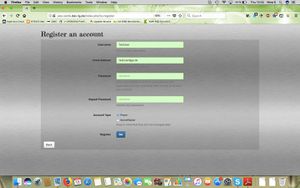


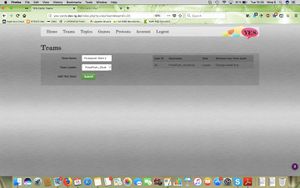
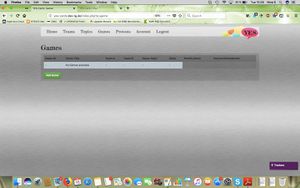


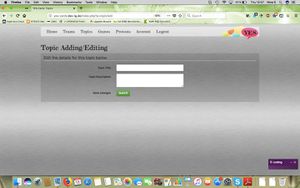
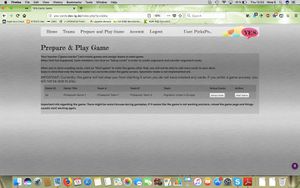
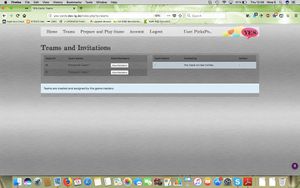
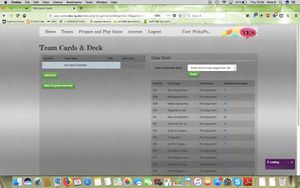

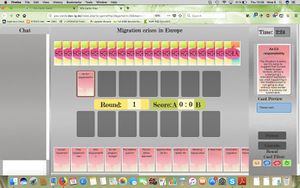

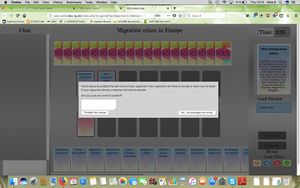
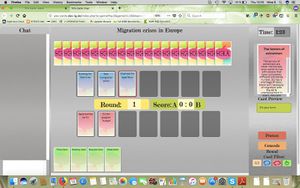
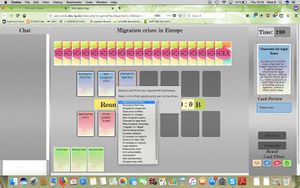
Good bye and the link to the YES Serious Game
Thank you for your interest in the YES MOOC.
Now enjoy the MOOC Game.
Just follow this Link to the YES Serious Game: